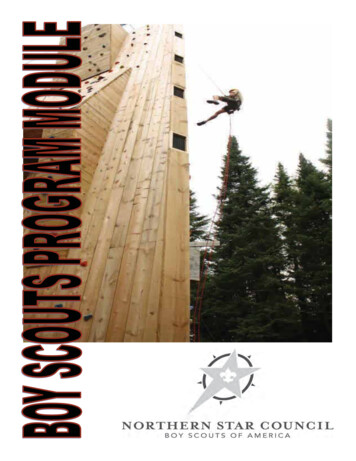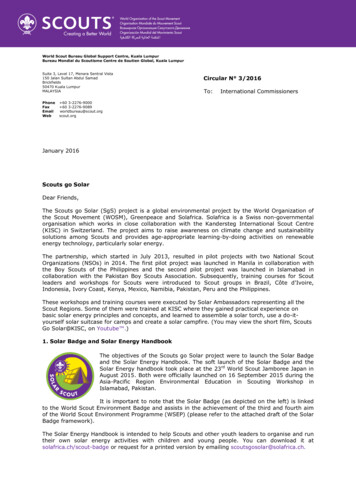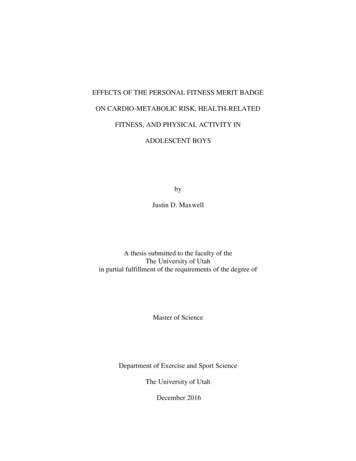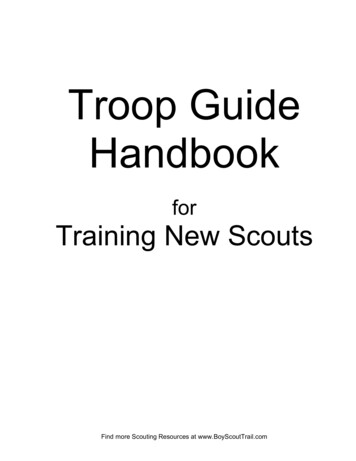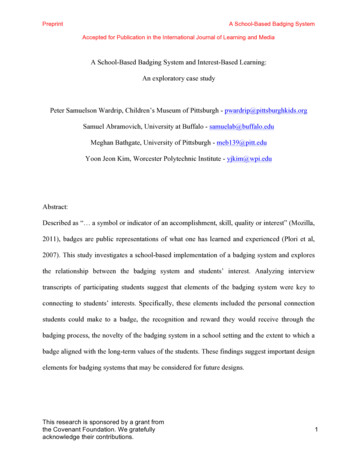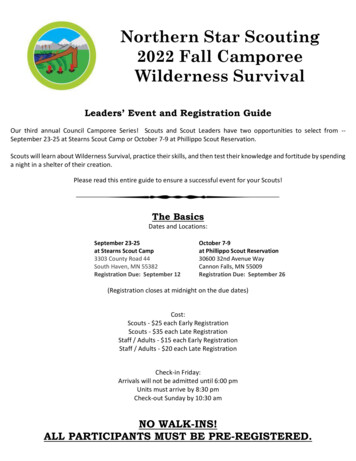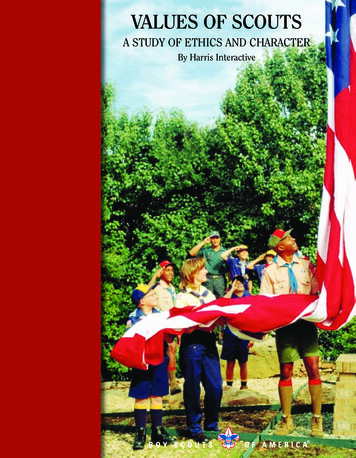
Transcription
VALUES OF SCOUTSA STUDY OF ETHICS AND CHARACTERBy Harris Interactive
The Scout LawA Scout ientCheerfulThriftyBraveCleanReverent
Values of ScoutsA Study of Ethics and CharacterResearch Conducted by Harris InteractiveReport Produced byBoy Scouts of AmericaYouth and Family Research CenterMay 2005
Table of ContentsIntroduction .5Scouting Provides Lifelong Benefits .5Scouting Builds Ethics and CharacterTrustworthy .7Loyal .8Helpful .12Friendly .13Courteous.14Kind .15Obedient .17Cheerful .20Thrifty .22Brave .24Clean .26Reverent .28Scouting Enhances Education .30Methodology .34
IntroductionFor almost 100 years, Scoutingprograms have instilled in youth thevalues found in the Scout Oath andLaw. Today, these values are just asrelevant in helping youth grow to theirfull potential as they were in 1910.Scouting helps youth develop academicskills, self-confidence, ethics, leadershipskills, and citizenship skills that influencetheir adult lives.The Boy Scouts of Americacommissioned Harris Interactive toconduct the Values of Americans studyto examine the ethics and character ofAmericans young and old, and to see ifvalues have changed over time. The BoyScouts also wanted to determine how Scouting has influenced the valuesof adults over their lifetimes and the lives youth members.Scouting has touched the lives of many youth and adults acrossAmerica. More than one in 10 boys (11 percent) in the United Statesis currently a Scout, and an additional 23 percent have been Scouts atsome point in their lives. Boys who are or were Scouts have been inthe program for an average of nearly five years. By the time boys reachadulthood, 54 percent have been in a Scouting program at some timein their youth. On average, men were youth members of a Scoutingprogram for four years; however, 42 percent stayed in Scouting for fiveor more years.Scouting Provides Lifelong BenefitsScouting provides youth with an opportunity to try new things, provideservice to others, build self-confidence, and reinforce ethical standards.These opportunities not only help them when they are young, but carryforward into their adult lives, improving their relationships, their work lives,their family lives, and the values by which they live. In fact, 83 percentof men who were Scouts agree that the values they learned in Scoutingcontinue to be very important to them today, with 63 percent who wereScouts five or more years strongly agreeing with this statement.5
Percentage Strongly/Somewhat AgreeingTotal Scouts100%80%87%71%Scout 5 Years83%70%60%40%20%0%I attribute some of my self-confidencein my work to having been a Scout.There have been real-life situationswhere having been a Scout helpedme to be a better leader.Base: 595 men who were Scouts as youth, 248 men who were Scoutsfive-plus yearsThe majority of men who were Scouts as youth say Scouting has beena positive influence in their lives. This sentiment is particularly strongamong men who remained in Scouting five or more years. Over twothirds of men who were Scouts attribute some of their self-confidencein their work to having been a Scout. Likewise, more than two-thirdssay there have been real-life situations where having been a Scouthelped them be a better leader, and half (50 percent) of men who wereScouts say their Scouting experience had a positive effect on their careerdevelopment and advancement.Men who were Scouts are more likely than those who have never beenScouts to have higher levels of education, have higher earnings, and toown their own homes. Ninety-one percent of men who were Scouts fiveor more years completed high school, compared with 87 percent of menwho were never Scouts. They are also more likely than non-Scouts toearn a college degree (35 percent versus 19 percent). In addition, menwho were Scouts five years or more have average household incomes of 80,000, compared to 61,000 reported by men who have never beenScouts. Almost three-fourths (74 percent) of men who were Scouts owntheir own homes, compared to 65 percent of men who were never Scouts.6
Scouting Builds Ethics and CharacterAs youth, Scouts are taught to live by a code of conduct exemplified inthe 12 points of the Scout Law, and they continue to live by these lawsin adulthood.TrustworthyA Scout tells the truth. He keeps his promises. Honesty is part of hiscode of conduct. People can depend on him.Three-fourths of youth who are or have been in Scouting say Scoutingteaches them to always be honest, as well as building their leadershipskills. Significantly more Scouts than non-Scouts report that theirleadership skills are excellent.Percentage of Youth Agreeing With Each StatementTotal Scouts0%10%20%30%Scout 5 Years40%50%Never a Scout60%Scouting has taught me toalways be honest.70%80%75%Scouting has taught me tobe a leader.76%48%My leadership skillsare excellent.57%37%Base: 275 youth who are or were Scouts, 77 youth who have five-plusyears in Scouting, 593 non-Scouts7
Men who were Scouts, especially those with five or more years’ tenure,agree that Scouting has taught them to always be honest. Scouting hashelped them develop dependability in following through on tasks theyset or that others set for them.Percentage Saying Scouting Has Developedor Had a Positive Effect on That TraitTotal ScoutsScout 5 Years96%100%84%80%82%68%80%67%60%40%20%0%Always being honestAbility to accomplishtasks you set yourselfAbility to accomplish tasksgiven to you by othersBase: 595 men who were Scouts as youth, 248 men who were Scoutsfive-plus yearsLoyalA Scout is true to hisfamily, Scout leaders,friends, school, and nation.Youth who are or havebeen Scouts value theircountry and family. Almostnine out of 10 Scouts feelproud to live in the UnitedStates. The majority ofScouts also value spendingtime with their families.8
Percentage of Scouts Agreeing With Each Statement0%20%40%60%80%100%I feel proud to live in the USA.88%Spending time with my familyis important to me.83%Base: 275 youth who are or were ScoutsScouts also develop strong relationships with their parents. Youth whohave been in Scouting five or more years are more likely than otheryouth to say their parents’ opinion is very important when selecting aclub or activity in which to participate.Percentage Saying This Group’s Opinion Is VeryImportant When Choosing a Club or ActivityScouts60%Scout 5 YearsNever a arent or guardianFriendsCelebritiesBase: 275 Scouts, 77 Scouts five-plus years, 593 non-Scouts9
Loyalty to family, friends, and country built in young Scouts continues toinfluence men in adulthood. Men who were Scouts as youth are more likelythan those who were not Scouts to say that having close family relationshipsis a key to happiness. Men who were Scouts are also far more likely thanthose who were not Scouts to have maintained lifelong friendships.Percentage Strongly Agree/YesTotal Scouts100%90%80%70%60%50%40%30%20%10%0%Scout 5 YearsNever a Scout89%85%79% 81%72%Having close family relationshipsis the key to happiness.74%I have friends or colleagues with whomI have/will have lifelong friendships.Base: 595 men who were Scouts as youth, 248 men who were Scoutsfive-plus years, 410 non-ScoutsMen with Scouting backgrounds also say Scouting has had a positiveimpact on their ability to work as a team, improved their family life atthe time they were Scouts, and has helped them have a happier familylife today. They also credit Scouting with building pride in their countryand are more likely than men who have never been Scouts to say thatvoting in every election is essential to good citizenship (47 percent versus29 percent).10
Percentage Saying Scouting Has Developedor Had a Positive Effect on That TraitTotal Scouts80%94%96%100%84%Scout 5 Years82%80%73%70%59%60%40%20%0%Being a goodteam playerHaving pridein your countryFamily life whilea ScoutFamily life inlater yearsBase: 595 men who were Scouts as youth, 248 men who were Scoutsfive-plus years11
HelpfulA Scout is concerned about other people. He does things willinglyfor others without pay or reward.Eight of 10 youth (80 percent) who are Scouts believe that helpingothers should come before one’s own self-interest. Scouts show theircommitment to help others through their actions. Significantly moreScouts than non-Scouts say they would visit a retirement home afterschool. Non-Scouts are more likely to choose to go home and dosomething else.Your Teacher Arranges for Students to Visita Retirement Home After School. Would You . . .Total ScoutsScout 5 YearsNever a Scout60%49%50%41%40%30%20%34%36%30%30%35%21% 23%10%0%Choose to go home anddo something else?Tell your teacheryou can go visit?Tell your teacher youwill think about it?Base: 275 Scouts, 77 Scouts five-plus years, 593 non-ScoutsScouting activities teach youth the patrol method of working as a team.Men continue to use the skills they learned through the patrol method intheir adult life. Because of this, men say Scouting helped them developthe ability to work with others and the ability to help others accomplishtheir goals.12
Percentage Saying Scouting Helped Developor Had a Positive Effect on That TraitTotal Scouts100%Scout 5 Years88%75%80%74%61%60%40%20%0%Ability to workwith other peopleAbility to help othersaccomplish their goalsBase: 595 men who were Scouts as youth, 248 men who were Scoutsfive-plus yearsFriendlyA Scout is a friend to all. He is a brother to other Scouts. He seeksto understand others. He respects those with ideas and customsother than his own.Eight of 10 youth who are Scouts agree that Scouting has taught themto treat others with respect. In addition, the majority credit Scouting ashelping teach them how to get along with others.Percentage of Scouts Who Agree With Each Statement0%20%Scouting has taught me totreat others with respect.Scouting has taught me toget along with others.40%60%80%100%80%78%Base: 275 youth who are or were Scouts13
CourteousA Scout is polite to everyone regardless of age or position. He knowsgood manners make it easier for people to get along together.Almost nine of 10 Scouts think older adults should be treated withrespect, and most say Scouting taught them to show adults respect.Percentage of Youth Agreeing With Each Statement0%20%40%60%80%Older people shouldbe respected.100%87%Scouting has taught me torespect adults.75%Base: 275 youth who are or were ScoutsMen who were Scouts continue to place value on showing othersrespect. They say Scouting taught them to respect their elders andpeople they work with.Percentage Saying Scouting Developed orHad a Positive Effect on That TraitTotal Scouts100%80%94%82%Scout 5 Years88%76%60%40%20%0%Respecting the elderly14Treating co-workers or colleagueswith respectBase: 595 men who were Scouts as youth, 248 men who were Scoutsfive-plus years
KindA Scout understands there is strength in being gentle. He treatsothers as he wants to be treated.Scouting teaches youth to care for other people, and more than fourof 10 Scouts (43 percent) say their skills at helping others in need areexcellent, while around three of 10 non-Scouts (34 percent) say theirhelping skills are excellent.Percentage of Youth Agreeing With Each StatementTotal Scouts0%20%Scout 5 Years40%60%Scouting has taught me tocare for other people.Never a Scout80%100%78%43%My skills in helping otherpeople in need are excellent.46%34%Base: 275 Scouts, 77 Scouts five-plus years, 593 non-Scouts15
Scouting teaches service and instills the value of helping those lessfortunate. Men who were Scouts, especially those who were Scouts forfive or more years, say Scouting has taught them to show understandingto those less fortunate than themselves.Percentage Saying Scouting Developed or Hasa Positive Effect on That TraitTotal ScoutsScout 5 Years95%91%90%85%80%79%75%70%Showing understanding to those less fortunate than yourselfBase: 595 men who were Scouts as youth, 248 men who were Scoutsfive-plus years16
Men who were Scouts are also more likely than non-Scouts to say thatshowing concern for their neighbor’s property is an absolutely essentialpart of good citizenship.Percentage Saying Absolutely EssentialTotal Scouts40%35%33%Scout 5 YearsNever a Scout37%30%25%24%20%15%10%5%0%Showing concern for your neighbor’s propertyBase: 595 men who were Scouts as youth, 248 men who were Scoutsfive-plus years, 410 non-ScoutsObedientA Scout follows the rules of his family, school, and troop. He obeysthe laws of his community and country. If he thinks these rules andlaws are unfair, he tries to have them changed in an orderly mannerrather than disobey them.“Do my best” is near the beginning of the Cub Scout Promise and theScout Oath. Scouts agree that Scouting teaches them to give their besteffort in everything they do. They also say Scouting has encouragedthem to set goals for their future.17
Percentage of Scouts Agreeing With Each Statement0%20%40%60%80%100%Scouting taught me to alwaysgive my best effort.78%Scouting taught me to setgoals for myself.78%Base: 275 ScoutsBoys who have been in Scouting five years or more are better able toreject peer pressure. They are more likely than boys who have neverbeen Scouts to say they would not hang out with youth they knowcommit delinquent acts, even when peer pressure from their best friendis applied (61 percent Scouts five-plus years versus 53 percent nonScouts). They also said they would not aid or abet a friend’s unlawful act,such as taking stolen property, with around 90 percent of Scouts sayingthey would give an apple back to the store owner or the person whostole it, compared with 81 percent of non-Scouts.Your Friend Takes an Apple From a Stand Without Paying forIt and Gives It to You. Would You . . .Total ScoutsScout 5 YearsNever a Scout57%60%52%50%48%37%40%33% 33%30%18%20%10%11% 10%0%Eat the apple?18Take it back to thefruit stand?Give it back to your friendand say you’d rather not eat it?Base: 275 Scouts, 77 Scouts five-plus years, 593 non-Scouts
Almost all men with Scouting backgrounds say that through Scoutingthey learned to respect the lives and property of others. They also saythe values they learned through Scouting have helped them avoiddifficulty with the law.Percentage Saying Scouting Developed orHad a Positive Effect on That TraitTotal Scouts95%100%80%Scout 5 Years83%79%66%60%40%20%0%Respecting the life andproperty of othersAbility to avoid difficultywith the lawBase: 595 men who were Scouts as youth, 248 men who were Scoutsfive-plus years19
Scouting instills in youth and men respect for laws and doing what isethically and morally right. A large percentage of men with Scoutingexperience indicate that unethical behaviors are absolutely wrong underall circumstances. This is especially true among men who were Scouts forfive or more years. Men with longer tenure in the Scouting program aremore likely than non-Scouts to indicate that behaviors such as tossingtrash out while driving, exaggerating one’s education or experience ona resume or job application, keeping excess change, and taking pensor paper from the office for personal use are absolutely wrong under allcircumstances.Percentage Saying This Is Absolutely Wrong UnderAll CircumstancesTotal Scouts100%90%80%70%60%50%40%30%20%10%0%Scout 5 YearsNever a Scout91% 92% 87%75% 79%66%69% 73% 68%70% 71%63%57%53%53%Tossing out trash Exaggerating Not declaring Keeping excess Taking pens orwhile driving one’s education all one’s income change given paper from theat a storeoffice foron a resumeto the IRSpersonal useBase: 595 men who were Scouts as youth, 248 men who were Scoutsfive-plus years, and 410 men who were never ScoutsCheerfulA Scout looks for the bright side of things. He cheerfully does tasksthat come his way. He tries to make others happy.Overall, Scouts are happy with their schools and their neighborhoodenvironments. However, Scouting builds high ideals in youth. They aremore likely than other youth to say they are less satisfied with the waythe world is today.20
Satisfaction With EnvironmentsTotal Scouts90%78% 77% 80%80%79% 76%Scout 5 YearsNever a Scout83%70%60%52%47%50%39%40%30%20%10%0%Your schoolYour neighborhoodThe world todayBase: 275 Scouts, 77 Scouts five-plus years, 593 non-ScoutsMen who were Scouts as youth generally have a more positive outlookon life. They are more satisfied than other men with their personal livesand their jobs or occupations. However, they too have high ideals andare less satisfied with American society and the way the world is today.Percentage Very/Somewhat SatisfiedTotal Scouts100%Scout 5 YearsNever a Scout97%94%91%77% 83%80%73%60%48%52% 54%40%40%45% 44%20%0%Your present lifeYour job oroccupationAmerican societytodayThe world todayBase: 595 men who were Scouts as youth, 248 men who were Scoutsfive-plus years, 410 non-Scouts21
ThriftyA Scout works to pay his way and to help others. He saves forunforeseen needs. He protects and conserves natural resources. Hecarefully uses time and property.Men who were Scouts credit Scouting with helping them be morefinancially responsible. In addition, they say Scouting helped themdevelop hobbies and interests allowing them to more productively usetheir time.Percentage Saying Scouting Developed orHad a Positive Effect on That TraitTotal ScoutsScout 5 Years100%83%80%65%60%79%73%59%64%40%20%0%Being successfulin your careerBeing responsiblefinanciallyHobbies and interestsBase: 595 men who were Scouts as youth, 248 men who were Scoutsfive-plus years22
Scouts agree that Scouting teaches them to prepare for unforeseenneeds. Boys who are Scouts report that Scouting has helped them saveand plan for the future. More than eight of 10 Scouts (82 percent) saysaving money for the future is a priority of theirs. Scouting activities haveincreased youths’ interest in emergency preparedness, and Scouts whohave been in the program for five or more years are more likely thannon-Scouts to rate their emergency preparedness skills as excellent.Percentage of Youth Agreeing With Each StatementTotal Scouts0%20%Scout 5 Years40%60%Saving money for the futureis a priority.Never a Scout80%100%82%Scouting has increased myinterest in emergencypreparedness.78%41%My skills in emergencypreparedness are excellent.52%36%Base: 275 Scouts, 77 Scouts five-plus years, 593 non-Scouts23
BraveA Scout can face danger even if he is afraid. He has the courageto stand for what he thinks is right even if others laugh at orthreaten him.Scouting teaches boys to be brave and to have self-confidence so theyare able to remain calm in any situation. Most Scouts, especially thosewith five or more years tenure, rate themselves as having excellent selfconfidence. In fact, Scouts rate their self-confidence significantly higherthan do boys who have never been Scouts.Percentage of Youth Agreeing With Each StatementTotal Scouts0%20%Scout 5 Years40%60%Scouting has taught me tohave confidence in myself.Never a Scout80%100%80%51%I have excellentself-confidence.58%42%Base: 275 Scouts, 77 Scouts five-plus years, 593 non-ScoutsScouts also act with courage. Significantly more Scouts than non-Scoutssay they would report a classmate with a gun to a teacher or other adult.24
You See a Classmate Bring a Gun to Class. Would You . . .Total Scouts90%Scout 5 YearsNever a Scout84% 83%80%71%70%60%50%40%30%20%10%8%6%14%7%9%14%0%Not say anythingto anyone?Tell your teacheror a parent?Tell your friendsbut no one else?Base: 275 Scouts, 77 Scouts five-plus years, 593 non-ScoutsMen with Scouting backgrounds say that through the many activitiesScouting provides, Scouts build confidence in their abilities and gain thecourage to overcome problems and adversity throughout their lives.Percentage Saying Scouting Developed orHad a Positive Effect on That TraitTotal Scouts100%80%93%80%Scout 5 Years91%74%60%40%20%0%Having confidence in your abilitiesOvercoming adversity orproblems with courageBase: 595 men who were Scouts as youth, 248 men who were Scoutsfive-plus years25
CleanA Scout keeps his body and mind fit and clean. He goes aroundwith those who believe in living by these same ideals. He helps keephis home and community clean.Through Scouting activities and service projects, boys learn to respectand care for the environment. Scouting has also increased boys’ interestin the environment. More than half of Scouts (53 percent) who have beenin the program five or more years say preserving the environment is veryimportant to them. Many also rate their environmental skills as excellent.Percentage of Youth Agreeing With Each StatementTotal Scouts60%65%70%75%80%Scouting has taught me to takebetter care of the environment.Scouting increased my interestin the environment.79%69%Base: 275 ScoutsScouting handbooks emphasize healthy living and physical fitness;therefore, it is not surprising that almost three-fourths of Scouts sayScouting has increased their interest in physical fitness. More than halfrate their physical fitness skills as excellent.26
Percentage of Youth Who Agree With Each StatementTotal Scouts0%10%20%30%Scout 5 Years40%50%Never a Scout60%Scouting has increased myinterest in physical fitness.70%80%73%54%My physical fitness skillsare excellent.60%52%Base: 275 Scouts, 77 Scouts five-plus years, 593 non-ScoutsLike boys, men who were Scouts say environmental concern is anothervalue they learned through Scouting. Men also say Scouting has helpedthem develop better health and fitness habits.Percentage Saying Scouting Developed orHad a Positive Effect on That TraitTotal ScoutsScout 5 Years95%100%84%80%72%59%60%40%20%0%Taking better care of the environmentHealth and fitnessBase: 595 men who were Scouts as youth; 248 men who were Scoutsfive-plus years27
Compared with men who were never Scouts, significantly more menwho were Scouts five or more years say it is absolutely essential to keepone’s property clean and tidy and to stay physically fit.Percentage Saying Absolutely EssentialTotal ScoutsScout 5 YearsNever a Scout28%30%24%25%25%23%19%20%21%15%10%5%0%Keeping one’s property clean and tidyKeeping physically fitBase: 595 men who were Scouts as youth, 248 men who were Scoutsfive-plus years, 410 non-ScoutsReverentA Scout is reverent toward God. He is faithful in his religious duties.He respects the beliefs of others.Scouting experience also influences religious service attendance. Menwho were Scouts as youth attend religious services more frequentlythan those who were never Scouts. In fact, nearly one quarter of nonScouts never attend, compared with 17 percent of men with Scoutingbackgrounds. Men who were Scouts five or more years are also morelikely than men who have never been Scouts to say attending religiousservices together as a family (83 percent versus 77 percent) and givingfinancial support to religious organizations (56 percent versus 49percent) are very important.28
Percentage Attending Religious ServicesTotal ScoutsScout 5 YearsNever a Scout30%25%25%20%15%19%16%26%23%20%19%16% 16%15%14%13%10%11%17%13%9% 10% 9%5%0%More thanonce a weekOnce aweekTwo to three About onceLess thantimes a month a month once a monthNeverBase: 595 men who were Scouts as youth, 248 men who were Scoutsfive-plus years, and 410 men who were never Scouts29
Scouting Enhances EducationBoys who are Scouts are involved in a variety of other after-schoolactivities. In fact Scouts are more often involved in after-school activities suchas sports, visual arts, or hobbies than are boys who have never been Scouts.Things Done While Not in SchoolScouts0%10%20%30%40%70%80%72%36%Music, dance, drama22%29%Arts and crafts21%39%Hobbies29%27%School clubs19%20%Farming and gardening15%12%Yearbook or newspaper5%3060%75%SportsNone of these50%Never a Scout5%10%Base: 275 Scouts, 593 non-Scouts
Scouts are more likely than boys who have never been Scouts to reportthey earn mostly A’s. This is especially true of boys who have been Scoutsfor five or more years.Grades in SchoolScouts0%5%10%Scout 5 Years15%20%25%Never a Scout30%35%40%25%Mostly A’s29%17%28%Mostly A’s and B’s34%32%13%Mostly B’s12%13%14%Mostly B’s and C’s7%21%6%Mostly C’s4%3%7%Mostly C’s and D’s10%5%2%Mostly D’s and F’s4%3%3%Not sure0%4%Base: 275 Scouts, 77 Scouts five-plus years, 593 non-Scouts31
More than half of all Boy Scouts agree that Scouting has improved theirperformance in academic and non-academic areas, particularly in athleticskills, science, reading, and math.Percentage Who Agree Scouting Has HelpedPerformance in Specific Subject Areas0%10%20%30%40%50%60%Athletic skills66%ScienceReadingMathBase: 275 boys who are or were Scouts3270%56%52%50%
Demographic Characteristics of ScoutsYouthAdults275595BaseRaceWhiteAfrican AmericanAsian or Pacific IslanderNative American or Alaskan NativeOtherNot sureEthnicityHispanic/Latino originNot of Hispanic/Latino originNot sureLiving ArrangementsBoth parentsMother onlyParent and stepparentMother sometimes and fathersometimesFather onlyOne parent and their companionRelativeSomeone elseMarital StatusMarriedNever marriedDivorcedSingle, but living with %8%6%2%1%* Question not asked of that group** Less than 1 percent33
MethodologyThe study presented herein comprises two interrelated surveys: oneof adult men and women, and the other with males and females in thefourth through 12th grades. Both surveys were conducted in Septemberand October 2004.The adult survey was administered via telephone to a random sampleof 1,524 adults aged 18 and older across the United States. Of the 1,524adults, 595 had been members of the Boy Scouts of America during theiryouth.The youth survey consists of a paper survey distributed to a randomsample of 1,714 youth attending public, private, and parochial schoolsacross the United States. Of the 1,714 youth, 275 are or have been in aScouting program.34
Cub Scout PromiseI promise to do my bestTo do my duty to God and my country,To help other people, andTo obey the Law of the Pack.Scout OathOn my honor I will do my bestTo do my duty to God and my countryand to obey the Scout Law;To help other people at all times;To keep myself physically strong, mentally awake,and morally straight.Venturing OathAs a Venturer, I promise to do my duty to God and helpstrengthen America, to help others, and to seek truth,fairness, and adventure in our world.35
3602-8822005 Printing
others should come before one's own self-interest. Scouts show their commitment to help others through their actions. Significantly more Scouts than non-Scouts say they would visit a retirement home after school. Non-Scouts are more likely to choose to go home and do something else. Your Teacher Arranges for Students to Visit
